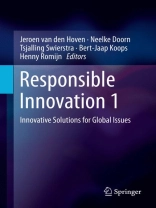This book addresses the methodological issues involved in responsible innovation and provides an overview of recent applications of multidisciplinary research. Responsible innovation involves research into the ethical and societal aspects of new technologies (e.g. ICT, nanotechnology, biotechnology and brain sciences) and of changes in technological systems (e.g. energy, transport, agriculture and water). This research is highly multidisciplinary. It involves close collaboration between researchers in such diverse fields as ethics, social science, law, economics, applied science, engineering – as well as innovative, design-oriented and policy-relevant. Although there is a trend to engage ethicists and social scientists early in technology development, most literature in the field of Technology Assessment or Ethics of Technology is still aimed at one discipline whereas this book incorporates different approaches and to discuss experiences, lessons and more general theoretical issues.
Cuprins
Preface (Jeroen van den Hoven, Bert-Jaap Koops, Henny Romijn, Tsjalling Swierstra, and Neelke Doorn).- PART 1: METHODOLOGICAL AND CONCEPTUAL ISSUES: Introduction (Jeroen van den Hoven).- Technology Assessment for Responsible Innovation (Armin Grunwald).- The quest for the “right” impacts of science and technology. An outlook towards a framework for responsible research and innovation (René von Schomberg).- PART 2: INSTITUTIONAL DESIGN/GOVERNANCE.-Innovation and Responsibility: A managerial approach to the integration of responsibility in a disruptive innovation model (Xavier Pavie & Julie Egal).- Technology Transfer of Publicly Funded Re-search Results from Academia to Industry: Societal Responsibilities? (Elisabeth Eppinger & Peter Tinnemann).- The Assumption of Scientific Responsibility by Ethical Codes – the Legal Angle (H.C Wilms).- ‘How (not) to reform biomedical research. A review of some policy proposals (Jan De Winter).- PART 3: VALUES, CONFLICTS IN VALUE, VALUE AND CULTURE (VALUES IN A GLOBALIZING WORLD).- Responsible Design and Product Innovation from a Capability Perspective (A. Mink, V.S. Parmar, P.V. Kandachar).- Conceptualizing responsible innovation in craft villages in Vietnam (Jan Voeten, Nigel Roome, Nguyen Thi Huong, Gerard de Groot and Job de Haan).-Managing conflicting values in water systems: the necessity of cultural transitions in under-institutionalized countries’, (J.O. Kroesen & W. Ravensteijn).- Sustainable Innovation, Learning and Responsibility (Udo Pesch).- The family of the future: How technologies can lead to moral change (Katinka Waelbers and Tsjalling Swierstra).- PART 4: ETHICAL AND SOCIETAL ASPECTS OF CONCRETE TECHNOLOGICAL DEVELOPMENTS: Healthcare and medical sector.- Dilemmas of Responsible Innovation: The Case of Alzheimer’s Disease (Y. Cuijpers, H. van Lente, M. Boenink, E. Moors).- Towards innovative neuroimaging applications in health care: guiding visions of scientists and technology developers (M.E. Arentshorst, J.E.W. Broerse, A. Roelofsen, Tj. de Cock Buning).- Optimization of complex palliative care at home via teleconsultation (J. Hasselaar, J. Van Gurp, F. Duursma, M. Van Selm, H. Schers, E. van Leeuwen, K. Vissers).- Privacy aspects of video recording in the operating room (Claire B. Blaauw, John J. van den Dobbelsteen, Frank Willem Jansen, Joep H. Hubben).- Assessing the future impact of medical devices: Between technology and application (Neelke Doorn).- Information society, Security & military technology.- Video-surveillance and the production of space in urban nightlife districts (Irina van Aalst, Tim Schwanen & Ilse van Liempt).- Responsibly Innovating Data Mining and Profiling Tools (B. Custers, B. Schermer).- Military Robotics & Relationality: Criteria for Ethical Decision-Making (Lambèr Royakkers and Anya Topolski).- On Technology against Cyberbullying (Janneke M. van der Zwaan, Virginia Dignum, Catholijn M. Jonker, and Simone van der Hof)












